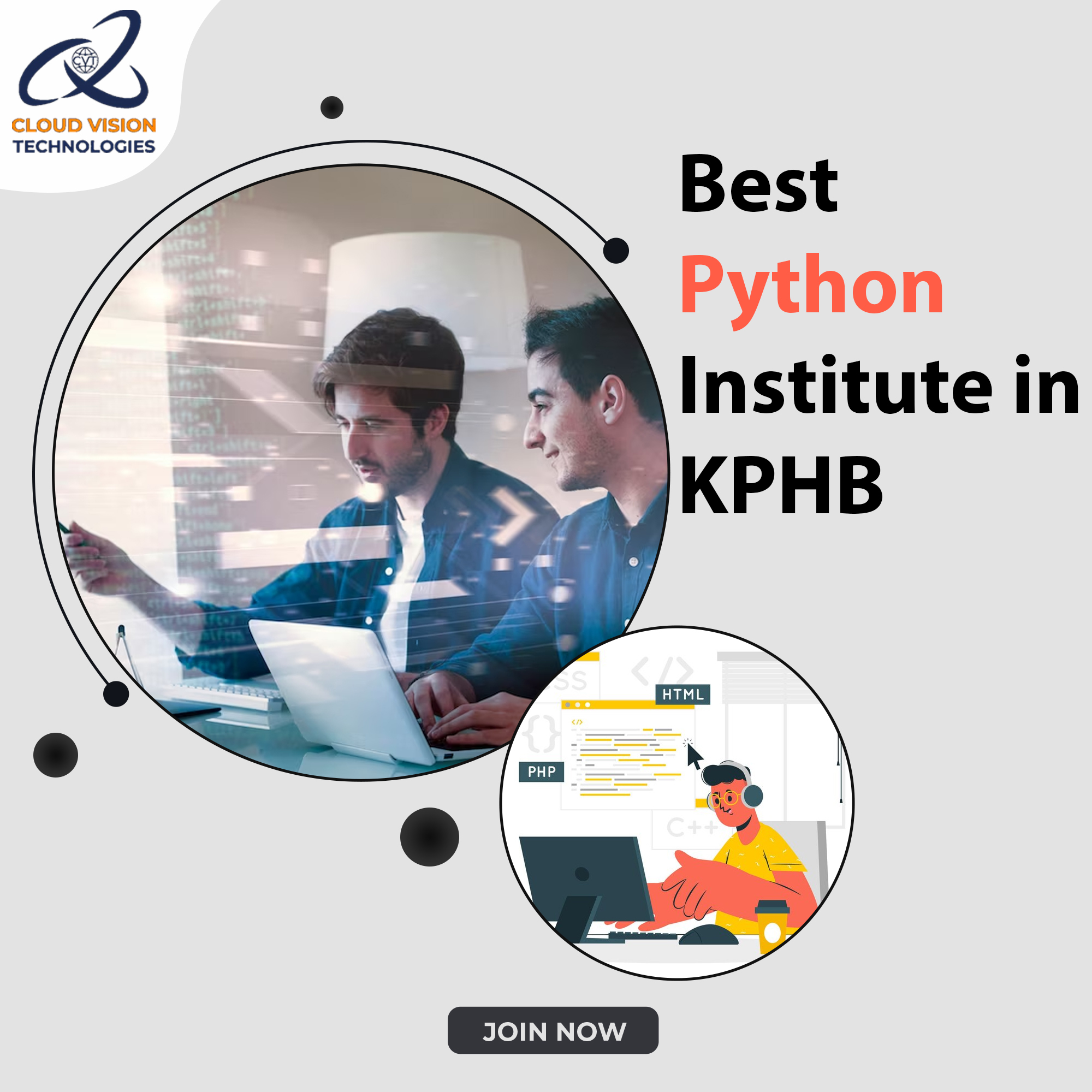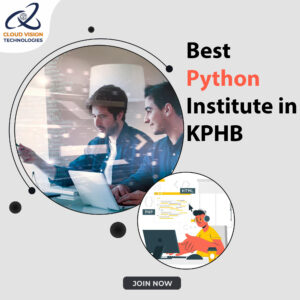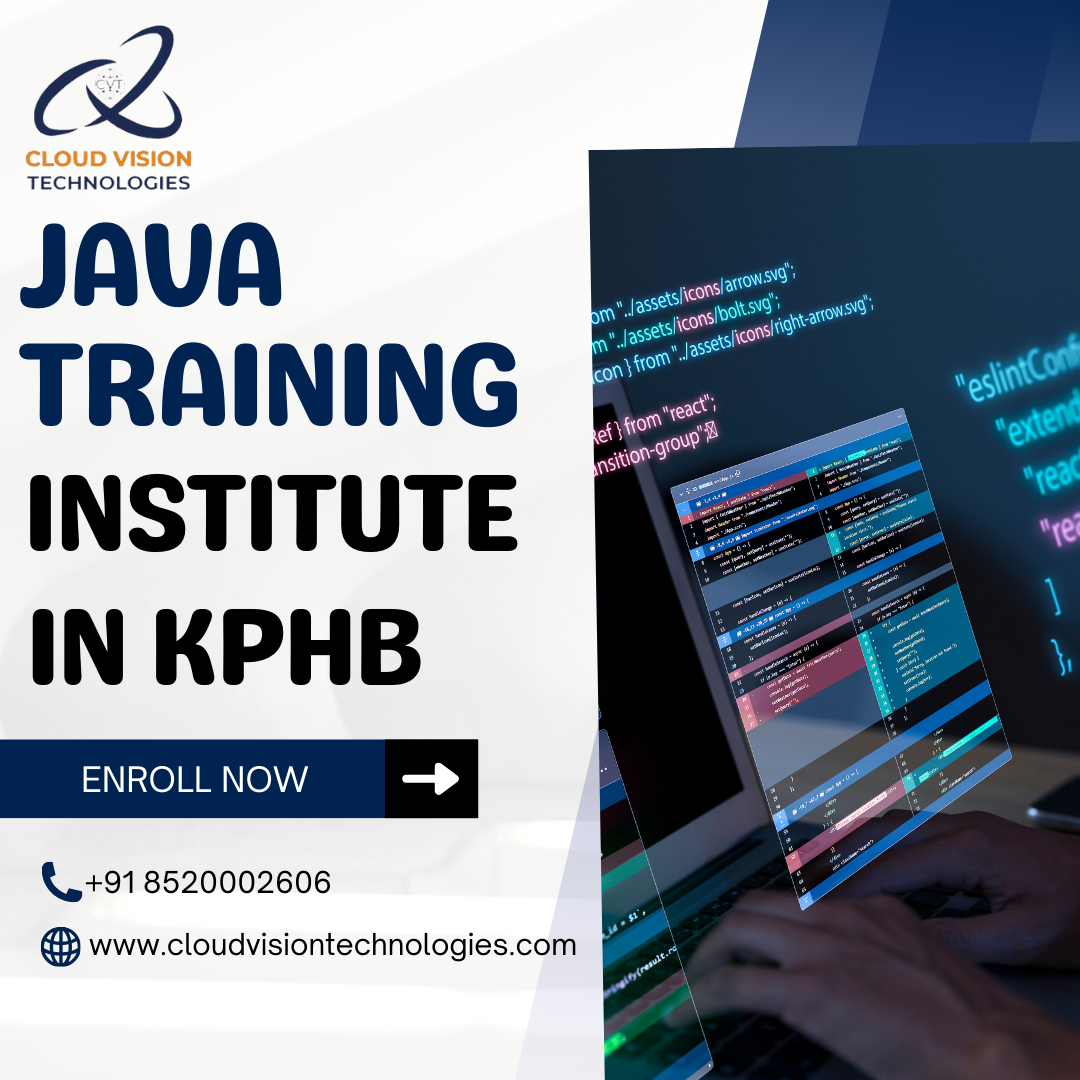
Best Python Institute in KPHB – Cloud Vision Technologies
Title: Unleash Your Potential with Cloud Vision Technologies: The Best Python Institute in KPHB
Introduction:
Welcome to Cloud Vision Technologies which is the best python institute in KPHB, where we transform aspirations into achievements and dreams into reality.
In the bustling hub of KPHB, Hyderabad, stands a beacon of excellence in Python education: Cloud Vision Technologies which is the best python institute in KPHB. Let’s explore why Cloud Vision Technologies is the undisputed leader in Python training in KPHB.
Introduction to Python and Cloud Vision Technologies
Understanding Python Programming
Python has emerged as a powerhouse in the world of programming, renowned for its simplicity, versatility, and readability. As a high-level, interpreted language, Python offers a wide array of applications across diverse domains, making it a favorite among developers, data scientists, and AI enthusiasts alike.
Overview of Python as a Versatile and Widely-Used Programming Language:
Python’s versatility stems from its rich library ecosystem, intuitive syntax, and ease of learning. With Python, developers can quickly prototype ideas, build scalable web applications, analyze vast datasets, and even develop complex artificial intelligence models.
Importance of Python in Various Domains:
Python’s appeal extends across numerous domains, including:

Web Development: Python frameworks like Django and Flask enable developers to build robust web applications with ease.
Data Science: Python libraries such as NumPy, Pandas, and Matplotlib facilitate data manipulation, analysis, and visualization, empowering data scientists to extract valuable insights from raw data.
Artificial Intelligence: With powerful libraries like TensorFlow and PyTorch, Python serves as a primary language for developing machine learning and deep learning models, driving advancements in AI research and applications.
Introduction to Cloud Vision Technologies
Cloud Vision Technologies which is the best python institute in KPHB stands as a beacon of excellence in the realm of IT education, particularly in KPHB, Hyderabad. With a steadfast commitment to quality, innovation, and student success, Cloud Vision Technologies which is the best python institute in KPHB has earned its reputation as a premier institute, empowering aspiring professionals to thrive in the ever-evolving tech landscape.
Overview of Cloud Vision Technologies which is the best python institute in KPHB as a Leading Institute in KPHB, Hyderabad:
Cloud Vision Technologies which is the best python institute in KPHB prides itself on offering cutting-edge training programs designed to equip individuals with the skills and knowledge needed to excel in the tech industry. With a team of experienced instructors, state-of-the-art facilities, and industry-relevant curriculum, Cloud Vision Technologies which is the best python institute in KPHB is at the forefront of IT education in the region.
Mission and Values of Cloud Vision Technologies:
At Cloud Vision Technologies which is the best python institute in KPHB, our mission is to empower individuals with the tools and expertise needed to succeed in the digital age. We are committed to providing quality education, fostering innovation, and nurturing a supportive learning environment where students can thrive. Our values of excellence, integrity, and inclusivity guide everything we do, ensuring that every student receives the highest standard of education and support on their journey to success.
Python Fundamentals
Basics of Python Programming
Python’s simplicity and readability make it an ideal language for beginners and experienced developers alike. In this section, we’ll explore the foundational concepts of Python programming, from its basic syntax to control flow statements.
Introduction to Basic Python Syntax, Data Types, Variables, and Operators:
Python boasts a clean and straightforward syntax, making it easy to write and understand code. It supports various data types such as integers, floats, strings, lists, tuples, dictionaries, and sets. Variables in Python are dynamically typed, meaning you don’t need to declare their type explicitly. Additionally, Python offers a rich set of operators for arithmetic, comparison, logical operations, and more.
Explanation of Control Flow Statements:
Control flow statements allow you to alter the flow of your program’s execution based on certain conditions. Python supports several control flow statements, including:
Loops: Loops allow you to execute a block of code repeatedly. Python provides two main types of loops: for loops and while loops.
Conditional Statements: Conditional statements enable you to execute different blocks of code based on specific conditions. The if, elif, and else statements are commonly used for this purpose in Python.
Data Structures and Functions in Python
Python offers a rich set of data structures and functions that allow developers to organize and manipulate data efficiently.
Overview of Fundamental Data Structures:
Lists: Lists are ordered collections of items, which can be of different data types. They are mutable, meaning you can change their elements after they are created.
Tuples: Tuples are similar to lists but are immutable, meaning their elements cannot be modified after creation. They are commonly used to store fixed collections of items.
Dictionaries: Dictionaries are unordered collections of key-value pairs. They provide fast access to values based on their keys.
Sets: Sets are unordered collections of unique elements. They are useful for performing mathematical set operations such as union, intersection, and difference.
Introduction to Functions, Parameters, Return Values, and Recursion:
Functions are blocks of reusable code that perform a specific task. In Python, functions can accept parameters, which are inputs passed to the function. They can also return values, which are outputs returned by the function. Recursion is a programming technique where a function calls itself to solve a problem. Python supports recursion, allowing you to write elegant and concise solutions to certain problems.
Understanding these fundamental concepts is essential for mastering Python programming and laying a solid foundation for further learning and development.
Advanced Python Concepts
Object-Oriented Programming (OOP) in Python
Object-Oriented Programming (OOP) is a powerful programming paradigm that allows developers to model real-world entities as objects, which have attributes (data) and methods (functions). Python is a multi-paradigm programming language that fully supports OOP principles. In this section, we’ll delve into the core concepts of OOP in Python.
Explanation of OOP Concepts:
Classes: A class is a blueprint for creating objects. It defines the attributes and methods that all objects of that class will have. In Python, classes are created using the class keyword.
Objects: Objects are instances of classes. They are created using the class constructor or instantiation method. Objects encapsulate data and behavior, allowing for modular and organized code.
Inheritance: Inheritance is a mechanism that allows a class to inherit attributes and methods from another class. The class that inherits from another class is called a subclass or derived class, while the class being inherited from is called a superclass or base class. In Python, inheritance is implemented using the syntax class Subclass(BaseClass):.
Polymorphism: Polymorphism allows objects of different classes to be treated as objects of a common superclass. It enables code reuse and flexibility by allowing different classes to implement the same methods in different ways. Polymorphism in Python is achieved through method overriding and method overloading.
Encapsulation: Encapsulation is the bundling of data and methods that operate on the data into a single unit, known as a class. It helps in hiding the internal state of an object and preventing external code from directly accessing or modifying it. Encapsulation promotes code modularity, reusability, and maintainability.
Python’s support for OOP makes it an excellent choice for building complex and scalable applications, as it allows developers to write clean, organized, and modular code that can be easily maintained and extended.
File Handling and Exception Handling
File handling and exception handling are essential aspects of Python programming, enabling developers to interact with external files and manage errors gracefully.
Overview of File Handling Operations:
Python provides built-in functions and methods for reading from and writing to files. The open() function is used to open files in different modes (e.g., read mode, write mode, append mode).
Once a file is opened, you can perform various operations such as reading data from the file (read()), writing data to the file (write()), and closing the file (close()). It’s important to close files properly after you’re done working with them to free up system resources.
Introduction to Exception Handling Mechanisms:
Exception handling allows developers to handle errors and unexpected situations gracefully, preventing program crashes and improving robustness.
Python provides a structured way to handle exceptions using try, except, finally, and else blocks. The try block contains the code that may raise an exception, while the except block handles the exception if it occurs. The finally block is executed regardless of whether an exception occurs or not, and the else block is executed if no exceptions are raised in the try block.
Additionally, Python allows you to raise custom exceptions using the raise keyword, enabling you to create custom error-handling logic tailored to your specific requirements.
By mastering file handling and exception handling in Python, developers can write more robust and reliable code that gracefully handles errors and interacts seamlessly with external resources such as files and databases.
Python for Web Development
Introduction to Web Development with Python
Python has become increasingly popular for web development due to its simplicity, flexibility, and robust frameworks. In this section, we’ll explore the basics of web development with Python, including popular frameworks and architectural patterns.
Overview of Web Development Frameworks in Python:
Django: Django is a high-level web framework that encourages rapid development and clean, pragmatic design. It follows the Model-View-Controller (MVC) architectural pattern and includes built-in features for authentication, URL routing, database integration, and more.
Explanation of the Model-View-Controller (MVC) Architecture:
The Model-View-Controller (MVC) architectural pattern is widely used in web development for separating concerns and organizing code.
View: The view is responsible for presenting the data to the user in a human-readable format. It typically consists of HTML templates combined with dynamic content generated by the controller.
Controller: The controller acts as an intermediary between the model and the view. It receives user input, processes requests, and updates the model accordingly. It then renders the appropriate view to display the results to the user.
Understanding the MVC architecture is essential for building scalable and maintainable web applications in Python.
Building Web Applications with Django
Django is a powerful web framework for building robust and scalable web applications in Python. In this section, we’ll provide a hands-on guide to building web applications with Django, covering its core features and functionalities.
Explanation of Django Features:
URL Routing: Django uses a URL routing mechanism to map URLs to views, allowing for clean and organized URL structures. URLs are defined in the project’s URL configuration file (urls.py) and mapped to corresponding views.
Templates: Django’s template engine allows developers to create dynamic HTML templates that can display data from the backend. Templates support template inheritance, context variables, and template filters for advanced customization.
Forms: Django provides built-in form handling capabilities for processing user input and validating data. Forms can be created using Django’s form classes and rendered in HTML templates with minimal boilerplate code.
Database Integration: Django comes with built-in support for ORM (Object-Relational Mapping), allowing developers to interact with databases using Python objects instead of raw SQL queries. Django supports multiple database backends, including PostgreSQL, MySQL, SQLite, and Oracle.
By leveraging Django’s powerful features and conventions, developers can build web applications rapidly while adhering to best practices and standards in web development. Whether you’re building a simple blog or a complex e-commerce platform, Django provides the tools and infrastructure needed to bring your ideas to life.
Real-World Projects and Case Studies
Showcase of Real-World Projects
Python is widely used across various industries for developing real-world solutions. Here, we showcase some inspiring projects developed using Python in different domains:
Web Development:
A dynamic e-commerce platform built with Django, featuring user authentication, product catalog management, and secure payment processing.
A content management system (CMS) developed using Flask, allowing users to create, edit, and publish articles with rich text formatting and multimedia support.
Data Science and Machine Learning:
A predictive analytics tool built with Python and libraries like NumPy, Pandas, and Scikit-learn, providing insights into customer behavior and market trends.
An image classification model trained with TensorFlow and Keras, capable of identifying objects and scenes in photographs with high accuracy.
Artificial Intelligence:
A chatbot application powered by natural language processing (NLP) techniques, offering personalized assistance and customer support in various industries.
An autonomous drone system utilizing computer vision algorithms to navigate through complex environments and perform tasks such as object detection and tracking.
These projects exemplify the versatility and power of Python in solving real-world problems across diverse domains.
Case Studies and Success Stories
At Cloud Vision Technologies which is the best python institute in KPHB, we’ve witnessed numerous success stories of individuals who have transformed their careers with Python skills acquired through our training programs:
John Smith: John, a former IT professional, enrolled in Cloud Vision Technologies’ which is the best python institute in KPHB to transition into the field of data science. With hands-on experience in Python and data analysis techniques, he secured a position as a data analyst at a leading analytics firm.
Emily Johnson: Emily, a recent graduate with a passion for artificial intelligence, enhanced her skills with Cloud Vision Technologies‘ which is the best python institute in KPHB. Armed with proficiency in Python libraries like TensorFlow and PyTorch, she landed a coveted role as a machine learning engineer at a renowned tech company.
These success stories underscore the impact of Python training at Cloud Vision Technologies which is the best python institute in KPHB in empowering individuals to achieve their career aspirations and excel in the competitive tech industry.
Conclusion:
Python training at Cloud Vision Technologies which is the best python institute in KPHB offers a comprehensive learning experience, combining expert instruction with practical, hands-on projects. Key highlights of our Python training program include:
Rigorous curriculum covering fundamental concepts, advanced topics, and real-world applications of Python.
Expert guidance from industry professionals with extensive experience in Python development.
Emphasis on practical learning through real-world projects, case studies, and hands-on exercises. Career support services including resume building, interview preparation, and job placement assistance. As Python continues to evolve and expand its influence in the tech industry, the future prospects for Python programmers are bright. Python’s versatility, ease of use, and extensive ecosystem of libraries and frameworks make it indispensable for a wide range of applications, from web development to data science, machine learning, and beyond.
At Cloud Vision Technologies, we remain committed to staying at the forefront of Python training, continually updating our curriculum to reflect the latest advancements and trends in the field. With our dedication to excellence and innovation, we aim to empower aspiring Python developers to thrive in the dynamic and ever-changing world of technology.
Cloud Vision Technologies which is the best python institute in KPHB stands as the premier destination for Python enthusiasts seeking top-notch training in KPHB. Our commitment to excellence, combined with a holistic approach to learning, sets us apart as the best Python institute in the region.
Moreover, Cloud Vision Technologies’ emphasis on hands-on learning, coupled with personalized career support and placement assistance, has paved the way for countless success stories. Our alumni have gone on to secure rewarding positions in leading tech companies, armed with the skills and expertise nurtured within our classrooms.
Looking ahead, as Python continues to dominate the technological landscape, Cloud Vision Technologies remains committed to staying at the forefront of Python education. We will continue to evolve our curriculum, incorporate the latest industry trends, and foster a vibrant learning community that empowers individuals to excel in their Python journey.
At Cloud Vision Technologies which is the best python institute in KPHB, we don’t just teach Python; we ignite a passion for innovation, creativity, and problem-solving. Join us, and embark on a transformative learning experience that will shape your future in the dynamic world of technology.
Address: Cloud Vision Technologies
Location: Office no : 1802B, 18th floor, Manjeera Trinity corporate Building,
KPHB, Kukatpally, Hyderabad, Telangana 500072
Contact Number : +91 8520002606
Mail ID: info@cloudvisiontechnologies.com
Website: https://www.cloudvisiontechnologies.com/





